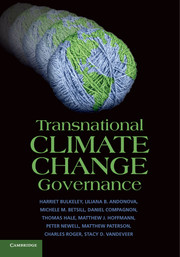Book contents
- Frontmatter
- Contents
- List of Figures and Tables
- Acknowledgements
- Acronyms and Abbreviations
- 1 Introducing Transnational Climate Change Governance
- 2 Mapping the World of Transnational Climate Change Governance
- 3 Theoretical Perspectives on Transnational Governance
- 4 Origins, Agency and the Forms of Transnational Climate Change Governance
- 5 Constructing Transnational Climate Change Governance Issues and Producing Governance Spaces
- 6 The Uneven Geography of Transnational Climate Change Governance
- 7 Understanding Authority and Legitimacy in Transnational Climate Change Governance
- 8 Making a Difference? Tracing the Effects and Effectiveness of Transnational Climate Change Governance
- 9 Conclusions – Looking Beyond Transnational Climate Change Governance
- References
- Index
4 - Origins, Agency and the Forms of Transnational Climate Change Governance
Published online by Cambridge University Press: 05 August 2014
- Frontmatter
- Contents
- List of Figures and Tables
- Acknowledgements
- Acronyms and Abbreviations
- 1 Introducing Transnational Climate Change Governance
- 2 Mapping the World of Transnational Climate Change Governance
- 3 Theoretical Perspectives on Transnational Governance
- 4 Origins, Agency and the Forms of Transnational Climate Change Governance
- 5 Constructing Transnational Climate Change Governance Issues and Producing Governance Spaces
- 6 The Uneven Geography of Transnational Climate Change Governance
- 7 Understanding Authority and Legitimacy in Transnational Climate Change Governance
- 8 Making a Difference? Tracing the Effects and Effectiveness of Transnational Climate Change Governance
- 9 Conclusions – Looking Beyond Transnational Climate Change Governance
- References
- Index
Summary
Introduction
This chapter examines the political dynamics underpinning the emergence of TCCG. In the first section of the chapter, we undertake a temporal analysis of the growth of TCCG, focusing on its parallel evolution with the international climate change regime and the broader political-economic shifts outlined in the previous chapter. In the second section of the chapter, our analysis turns to consider the patterns and drivers of private, hybrid and public transnational initiatives over time and to consider the governance functions that are being pursued in these different forms of TCCG. Through this analysis, we seek to capture the process through which climate politics has pluralised by describing and offering explanations for the growth of institutional diversity over time.
In doing so, the three theoretical lenses discussed in Chapter 3 serve as guides for our analysis. The agency-centred perspective is particularly helpful for highlighting the interests of the actors that populate climate politics, their sources of influence and factors underpinning the demand and supply of new forms of transnational governance. The social and system dynamics perspective helps to explain the diffusion of common practices and governance techniques through communities of environmental practitioners and policymakers. Finally, the critical political theory perspective sheds light on the marketisation of a substantial cluster of TCCG initiatives, the ideological underpinnings of these initiatives and the particular constellations of public and private forces that animate them. We use the TCCG database and illustrative case-studies to interrogate these issues illuminating the relationship between the agency of different actors, market logics, functional imperatives and normative contexts.
- Type
- Chapter
- Information
- Transnational Climate Change Governance , pp. 61 - 88Publisher: Cambridge University PressPrint publication year: 2014



